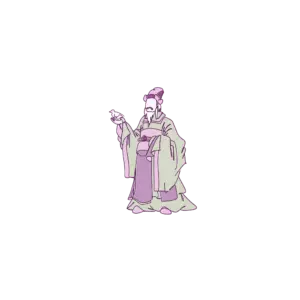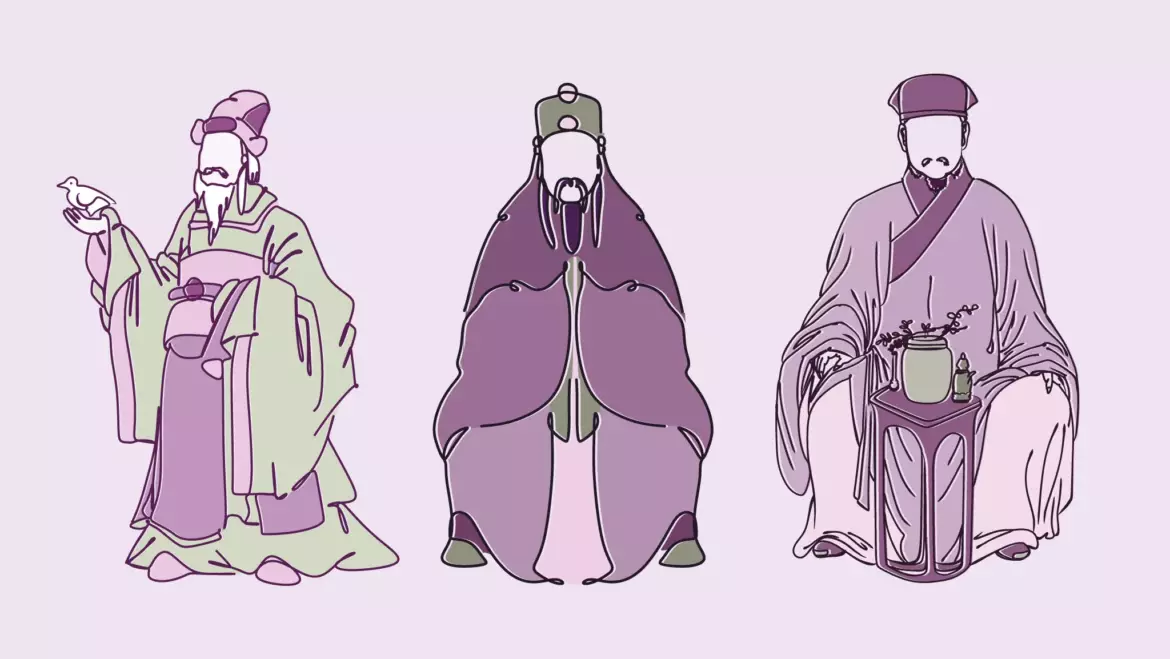6. Emperors of Ancient China: The Founders of Oriental Medicine
The fascinating history of ancient Chinese civilization is filled with legendary figures and iconic emperors who laid the foundation of Chinese society and left a lasting impact on the evolution of Oriental Medicine.
In this article, you will learn the history of three key emperors: Fú Xī, Shénnóng and Huángdì, who played a fundamental role in the development and promotion of the principles of traditional Chinese medicine.
Discover how these legendary emperors influenced medical practice and left a lasting legacy in the history of medicine.
Fú Xī, the White Emperor:
- The mythical figure of the first emperor of China
- A multifaceted legacy: fishing, hunting, livestock and marriage rites
- The author of the I-Ching: the ancient Chinese book of mutations
- The Eight Trigrams: the basis of Oriental Medicine
The title of China's first emperor is given to Fú Xī, a mythical figure whose actual existence has been the subject of debate. However, its influence on Chinese culture is undeniable.
Fú Xī is known for being a visionary entrepreneur who introduced several revolutionary advances in ancient Chinese society.
His contributions cover areas such as fishing, hunting, livestock and marriage rites. In addition, he is credited with authoring the I-Ching, also known as the Book of Mutations.
This ancient Chinese text is considered one of the country's oldest works and has been a spiritual and philosophical guide for centuries.
Fú Xī discovered the Eight Trigrams, a series of symbols that form the basis of the I-Ching and are used in Eastern Medicine as a diagnostic and treatment tool.

Shénnóng, the Red Emperor:
- The father of agriculture and herbal medicine
- The tireless search for medicinal plants
- The Divine Farmer's Classic of Roots and Herbs: An Herbal Encyclopedia
- The discovery of cannabis sativa and its therapeutic use
Shénnóng, known as the Red Emperor, is revered as the father of agriculture and herbal medicine in China.
His reign, believed to have occurred around 2838 B.C. to 2698 BC, was characterized by its devotion to the search for medicinal plants and their classification in terms of their therapeutic or poisonous effects.
Shénnóng is said to have tested hundreds of plants, identifying their properties and health benefits.
This knowledge was captured in a book called the Divine Farmer's Classic of Roots and Herbs. In this work, he precisely describes 365 different remedies derived from plants, animals and minerals, classifying them according to their toxicity.
A notable discovery attributed to Shénnóng is cannabis sativa, known in Chinese as Dà má, a plant with therapeutic properties used in traditional Chinese medicine.
However, Shénnóng cautioned that this plant is not suitable for all patients, as each individual's life energy varies.
 Huángdì, the Yellow Emperor:
Huángdì, the Yellow Emperor:
- The highest authority in ancient Chinese medicine
- The Nei Ching: The Yellow Emperor's Classic of Internal Medicine
- Transcendental dialogues with Qíbó and Shàoyú: the influential doctors
- Fundamental theories of Oriental Medicine: yīnyáng, wǔxíng and more
Huángdì, the Yellow Emperor, is one of the most revered emperors in Chinese history.
His reign, which is estimated to have taken place between the years 2698 B.C. and 2598 BC, was a period of great advancement in traditional oriental medicine.
Se le atribuye la autoría del Nei Ching, también conocido como el Clásico de la Medicina Interna del Emperador Amarillo.
He is credited with authoring the Nei Ching, also known as the Yellow Emperor's Classic of Internal Medicine.
The Nei Ching consists of two books: the Suwen and the Língshūjīng, which contain 81 chapters each. These books present dialogues between Huángdì and two prominent doctors of the time, Qíbó and Shàoyú.
The Nei Ching covers a wide range of medical topics, from the fundamental theories of Eastern Medicine, such as the yīnyáng (principle of complementary opposites) and the five elements (wǔxíng), to diagnostic methods, treatments and acupuncture points.
This monumental work has been fundamental to the development and practice of traditional Chinese medicine to this day.
The influence of Chinese emperors on Oriental Medicine has left a lasting legacy in the history of medicine.
Through their contributions and discoveries, Fú Xī, Shénnóng and Huángdì laid the foundation for medical practice in China and provided essential guidance for doctors of later generations.

Thanks to them, a rich medical tradition is preserved based on observation, experience and the balance of energies.
The knowledge transmitted by these emperors continues to be appreciated and valued throughout the world, and remains a source of inspiration for practitioners of Oriental Medicine in their pursuit of people's health and well-being.
From the dawn of Chinese history to the present day, Oriental Medicine has been enriched by the wisdom of these legendary emperors.

 Huángdì, the Yellow Emperor:
Huángdì, the Yellow Emperor:
Add Comment